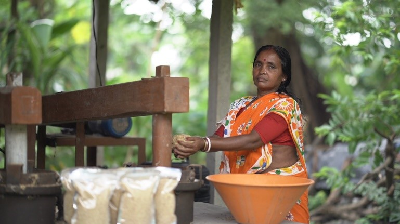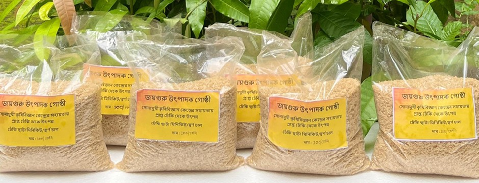In the serene village of Narayan Sundari in Manikbazar, Sonamukhi Block of Bankura district, lives Smt. Parul Biswas, a woman whose journey from struggle to self-reliance stands as a beacon of hope for many rural women.
Belonging to a poor family of four, Parul and her husband relied on daily wage labour to make ends meet, while their two sons worked outside the village. For years, the family battled financial instability and limited livelihood opportunities, their aspirations overshadowed by hardship.
Parul’s life took a transformative turn when CADC Krishi Vigyan Kendra (KVK), Bankura, in consultation with ICAR-ATARI, Kolkata, and under the aegis of the West Bengal State Rural Livelihoods Mission (WBSRLM), facilitated the formation of a women-led Producer Group named Jayguru Utpadak Goshti in her village.

Recognizing the potential of the group, CADC KVK extended comprehensive support to strengthen their livelihood initiatives. The group was provided with a Dheki-Chhata Rice Milling Machine a modern adaptation of the traditional hand-pounding rice processor worth ₹75,000. Alongside, Parul received lemon and coconut saplings, paddy seeds, and technical training valued at around ₹5,000. These interventions sowed the seeds of a new beginning.
Empowered with the Dheki-Chhata machine, Parul and other women of the group began processing paddy into rice and rice flour using this traditional yet efficient method. The initiative did more than just enhance their income it revived an indigenous, sustainable rice processing practice that connected modern livelihoods with age-old wisdom.
The results were remarkable. Parul’s monthly income rose by ₹3,000, significantly improving her family’s financial security. The success also sparked newfound confidence and a spirit of entrepreneurship among the women. Parul soon emerged as a leader, coordinating with CADC KVK to organize further training sessions and guiding her peers in production and marketing.
The Dheki-Chhata rice quickly gained popularity in nearby markets. Villagers were intrigued by its unique processing method and superior taste. The rice produced retained more nutrients and flavour compared to polished rice, making it both healthier and more desirable. Soon, their traditionally processed rice reached Kolkata markets, fetching higher returns and recognition for the group’s effort.
Parul’s journey underscores the transformative power of integrated institutional support, skill enhancement, and technology adoption in rural empowerment. It demonstrates that small, low-cost interventions when aligned with local traditions and market potential can yield sustainable and scalable results.

The revival of the Dheki-Chhata method illustrates how traditional knowledge, when blended with modern facilitation, can create niche, high-value products. Moreover, empowering women like Parul to take leadership roles fosters collective action, confidence, and entrepreneurship within the community proving that true empowerment flourishes when innovation honors cultural heritage.
The story of Parul Biswas is a testament to how targeted institutional guidance, capacity building, and appropriate technology can transform rural livelihoods sustainably. By reviving traditional agricultural practices through innovations like the Dheki-Chhata rice mill, women-led Producer Groups can enhance income, preserve heritage, and build self-reliance.
Parul’s success showcases a replicable model for women-centric rural development where policy support, market linkages, and continuous capacity building converge to create lasting impact. Her gratitude toward CADC KVK, Bankura, reflects the importance of sustained mentorship in nurturing rural women’s entrepreneurship.
Ultimately, Parul’s journey is not just about economic progress it is about reviving tradition, inspiring innovation, and empowering women to lead change from the heart of rural India.
(Source: ICAR- Agricultural Technology Application Research Institute, Kolkata)







फेसबुक पर लाइक करें
यूट्यूब पर सदस्यता लें
X पर फॉलो करना X
इंस्टाग्राम पर लाइक करें